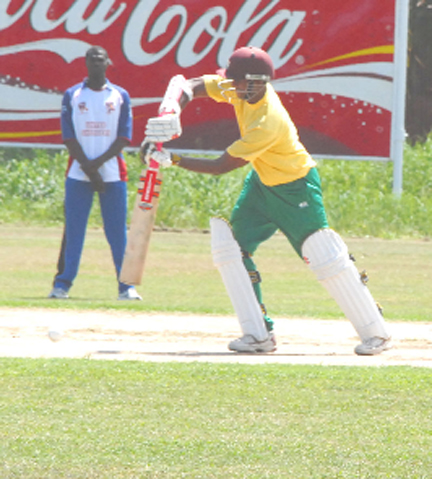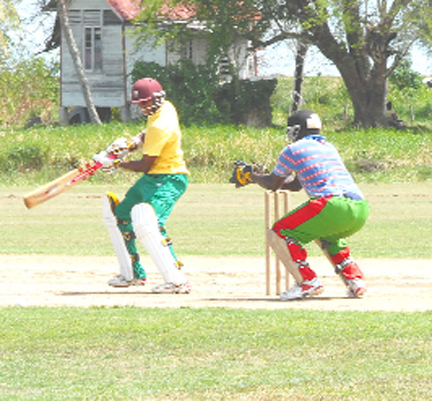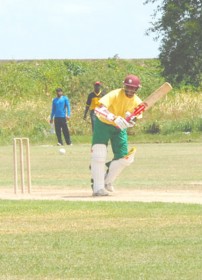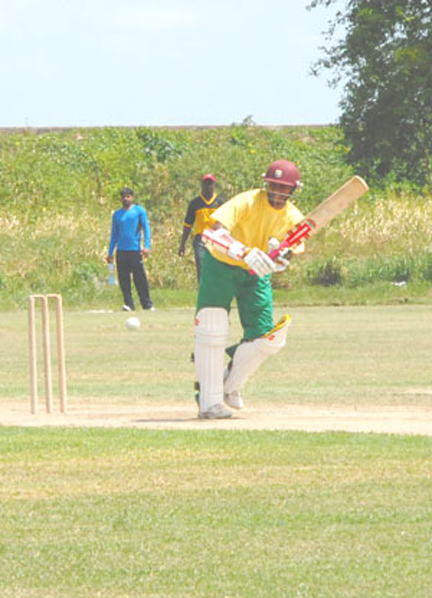By Marlon Munroe
Prolific West Indies middle order batsman Shivnarine Chanderpaul returned to Guyana on Tuesday to participate in today’s Guyana Cricket Board (GCB) Twenty20 Festival and also to participate in the WICB President’s Cup 50-over regional tournament scheduled from October 28 to November 5.

Playing in this tournament is a prerequisite for Chanderpaul’s selection (and that of other top flight players in the WI team as well) for next month’s tour to Australia since the West Indies Players’ Association and the West Indies Cricket Board had been embroiled in a bitter contract dispute that caused top players in the team to strike.
Thankfully that situation seems to have been resolved.
Yesterday this reporter caught up with (‘Tiger’) Chanderpaul at the Everest Cricket Club ground after a practice match and had a tete-a-tete on cricket in Guyana and in the West Indies. This is what he had to say:
MM: How do you feel to be home playing in the national colours?

SC: It is a pleasure to be back home playing and getting accustomed to the conditions, especially coming from England. I also have to get accustomed again to the wickets that are very slow and low and of course the heat.
MM: What have you noticed since you have been in the squad?
SC: There are some good young fellas coming up and our batting has been pretty solid so far. We have a few experienced guys around and we have some of the bowlers who are not so experienced and that might be a major problem knowing the teams we have to play (against) so the players will have to step up their game. (On the other hand) The batsmen also have to play well to make sure we have a decent total on the board and once we have that total we can possibly defend it.
MM: In what ways will you be helping the younger players in the squad?

SC: Whenever it’s a Twenty20 game we are playing – there is not much you can tell the guys. You will be able to see some things in between but in the 50-over game that is where we have to learn to turn over the strike in the middle stages of the game rather than go looking for boundaries all the time and throw our wickets away. We have to pick more singles up and we can still score five or six runs by just taking singles instead of getting too excited wanting to play too many big shots and getting out. You can block two or three balls an over, you hit one four, get a single, you will still get five or six runs an over. If you do it in singles it’s a much safer and smarter way to play the cricket and in the 50-over version that is the way we have to play the game because we have a lot of good hitters in the batting lineup. We need to play the cricket smarter.
MM: It has been awhile since Guyana’s team had so many players that have played for WI in the squad – how would you gauge the team’s chances when the tournament begins?
SC: Yes! Playing at home we will always have home advantage. It will all depend on how well we play. I can say we have a good team and a decent bowling attack because spin (bowling) plays a major part down here but yet on that day we still have to go out and perform well and you still have to play better than the opposition and if we don’t we will be beaten.
MM: How do you feel about Guyana’s cricket and the low standard at the moment, especially since you would have come from a period of great cricketing standards?
SC: About six to seven years back when I came back to play the standard had really dropped. It’s (standard) probably where we used to have second or third division cricket that we had in the past- you know some of the cricket that I came up with. The calibre of players you had around is not there anymore, you know. We have some young fellas who are trying and we still have some big name players.
But a lot of them are not at home playing and you can’t blame anybody because there is no money at home to keep players playing cricket. A guy has a family and he’s got to do something to survive and you cannot want to pay a man any money to stay home and play the cricket or he will go someplace else and earn a living because it is his job.
He has spent all his life playing and living cricket and then some say that the player is not interested in playing cricket because the guy has a contract overseas and he is doing all he can to break his contract to come home to play the cricket and you would hear things that the guy is not interested in coming home to play. (Officials) People have to take into consideration that persons have contracts and when they come home late you hear a lot of negative things.
You want to have your experienced players playing because that is the only way the standard of cricket is going to stay high. Experience mixing with the junior players they (younger players) would develop faster. If you have a bunch of junior players it’s harder for the youngsters to learn anything and they will have to learn it the hard way and it is difficult for them to learn cricket that way so when you have senior players around they will learn faster.
Some of the mistakes we have been making in the recent past, especially since we have some good young players around, we need some senior players around to help these young fellas. When I came into cricket I had a lot of senior players around and it helped me. When I played for GCC there were ‘Hoops’ (Carl Hooper), Paul Persaud, Sheik Mohammed, Faoud Bacchus, Timur Mohammed, Rupert Gomes, Garfield Charles, Andrew Jackman and you learned cricket from these guys. You learnt it the hard way; you learnt it the tough way. And playing for Guyana you had tough men like (Clayton) Lambert and Roger Harper and Clyde Butts and even the present coach Rabindranauth (Seeram). So you had players that used to keep the cricket at a high level and who used to keep you as a youngster intact and help you to learn things as quickly as possible because from these senior players you picked up things a lot quicker.
But when you have a young fella just come in and he thinks he is doing the right thing and there is nobody there to point out anything to him and say ‘I think you should do this or do that’, it is harder for them to learn.
I am saying give a little leeway to the fellas who are coming back so that they could play and the other fellas learn from them.
MM: Would you be coming back home at different periods to help with the development of Guyana’s cricket, especially since the GCB has rolled out its developmental thrust?
SC: I don’t mind coming back and helping with raising the cricket standard in Guyana but it will depend on my schedule because I am still playing; I still want to play cricket; I still love the game; if I am available I will gladly help.
MM: Just for the readers, what is it that makes Shivnarine Chanderpaul so successful?
SC: Well it is a lot of hard work and dedication. I go into the nets day in and day out and prepare; I’m not going to hit two balls because I know what I’m going to work on. As a batter you need to know what you are working on; you need to know who you are going to play against; you need to study people because you don’t just turn up and say I am going to do this because these things don’t happen; you have to look at bowlers; what are their strengths and weaknesses and you have to work on your strengths and weaknesses and make sure when you step on the park you are ready to play.
MM: People often comment about your dogged determination and your great ability to concentrate for long hours where was that quality birthed?
SC: You get a lot of help over the years from a lot of people and God has been a major part in helping me with all my concentration to clear my mind and just go out and play cricket. At one time I had Jimmy Adams as a roommate and Rohan Kanhai left me speechless and cold one time when I played a silly shot. A batter should not go out there and expect to just hit two balls and come back in you must stay out there and bat as long as you can; instead of hitting two balls you’ll be hitting more of them if you bat the entire day so these have been things people have been teaching you over the years.
MM: I know that this is a ticklish subject concerning WI cricket, are you satisfied with the standard at the moment?
SC: We have a lot of talent around it’s just that um…the cricket… the players are still there… you have good cricketers around and we just have to play the cricket that is about it.
MM: How do you feel, especially since there is the possibility that you will be selected after the regional tournament, how do you feel going back against the top international players?
SC: Well nobody knows what will happen when we step out on the park to play but you want to compete at the highest level. It’s a real challenge to be up there especially going to Australia. We have been there the last time and we know how tough it can be out there and hopefully we will see that we do well out there.
MM: Now that things have been settled, somewhat, between WICB and WIPA what would you like to see happen next?
SC: As a cricketer you don’t want to be mixed up with all these things and sometimes it’s out of their control and there is nothing you can do; you just want to be playing cricket, you don’t want to be always having problems here, there and everywhere – you just want to play cricket. I don’t want to be missing my cricket; I am a cricketer, I don’t want to be sitting home doing nothing. I was sitting home for a while and I called Durham and said I am going to come to England and I went and played some county cricket.
MM: What would you like to say to your admirers?
SC: Thanks for the support over the years and hopefully I would keep making them proud.

